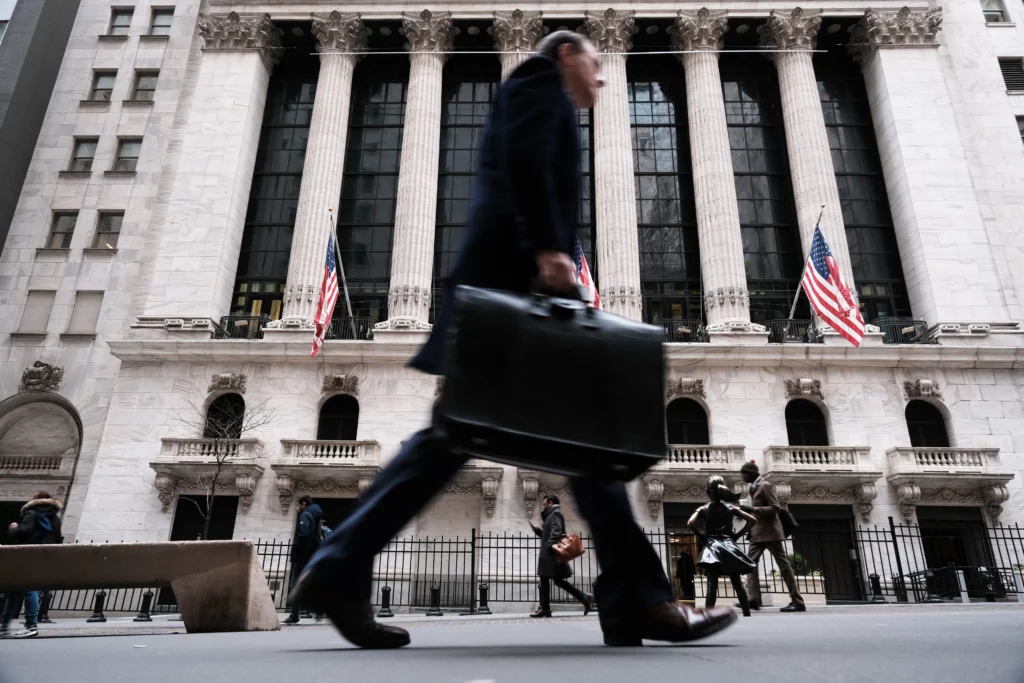Wall Street Versus London Stock Exchange: More Companies Ditching LSE Amid Undervaluation Concerns

Wall Street vs London Stock Exchange | Image: Spencer Platt/Getty Images
Key Takeaways
- London Stock Exchange witnessed its lowest capital raise since 2009, with just $1b in 2023.
- UK tech firm Arm Holdings bypassed London for New York with oil giant Shell expected to be the next exit.
- UK stocks underperformance linked to Brexit as US equities enjoy a premium.
London’s appeal for IPOs is reportedly waning, while the US market’s liquidity draws companies stateside. Wall Street’s gravitational pull is increasingly being felt in 2024 as UK companies seek higher valuations. What is the valuation gap and is Brexit to blame?
London’s Waning Stock Against the US
In 2023, the LSE hit a 14-year low in raised capital, managing just $1b. The valuations also signal a possible erosion of business confidence in UK public markets in 2024.
The US market accounts for around 45% of global market capitalization with the growth is nearly 15% since the 2008 financial crisis. Analysts see AI as a major sector providing liquidity.
UK-based chip maker Arm Holdings, which was on the cusp of being sold to Nvidia, has seen growing share valuations. But unfortunately for London, it is listed in New York.
UK’s Regulatory Woes as US Stock Market Grows
The UK market has seen a drastic reduction in daily traded volume, from £15b in February 2007 to a mere £3.4b in February 2024.
The thinning activity implies investor concerns about liquidity — essentially, how easy it is to buy and sell shares without impacting their price. Firms worry about “illiquidity discounts” and turn to markets where trading mitigates such risks. Moreover, the report also finds that the abundance of private equity options has overshadowed the traditional public offering route in London.
The UK government’s regulatory changes in the early 2000s could be partially responsible. Due to disclosure requirements, retirement and pension funds reportedly made a conservative shift from equities to government bonds.
How is Brexit Responsible?
Another reason that could be to blame is Brexit. As per a commentary by journalist Simon Nixon, before the event, the stocks were valued at a premium. Post-Brexit, the UK market saw a sizeable 25% discount in price-earnings ratio compared to US shares, as per Nixon. The stock market, he argues, reflects global investor sentiment toward Britain’s economic choices and political risks, suggesting that Britain’s status as a financial outlier has far-reaching economic implications.
According to Nixon, “The reality is that most institutional investors now look at asset allocation on a global basis, and with the UK comprising less than four per cent of global market capitalisation, many prefer to steer clear of a market that comes with so much political and currency risk. “
Meanwhile, some analysts, including those at Goldman Sachs, forecast that British equities will outshine US and EU benchmarks in 2024. As per a report by the Telegraph , Goldman Sachs expects a 9% return while Wall Street sees an average annual return of 6% over the next five years.
Bloomberg cautions that the UK small-cap index might disappear by 2028 given the ongoing takeover frenzy and a lackluster IPO market, as highlighted by London broker Peel Hunt.
The attractiveness of the United States might be further established if companies like Shein choose it as the IPO destination. Meanwhile, London faces another challenge with the potential departure of oil behemoth Shell. But regulatory modifications could enhance the region’s appeal for business and investment.
The UK stock market is at a crossroads. The reality of trading volumes, regulatory climate, and investor preferences will decide if UK and foreign firms will remain anchored in London or set sail for the promise of American shores.


